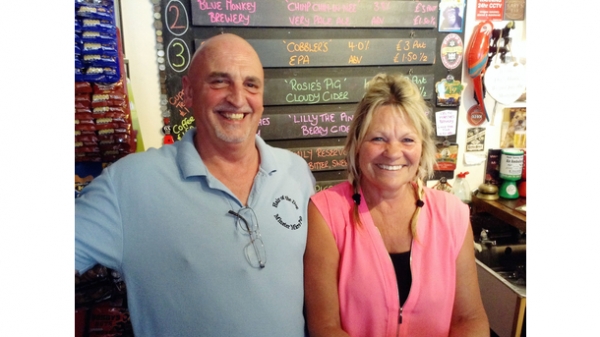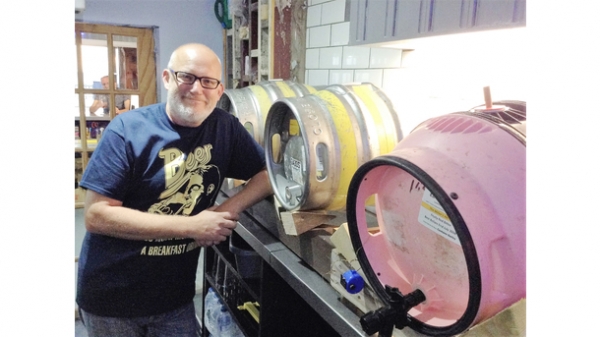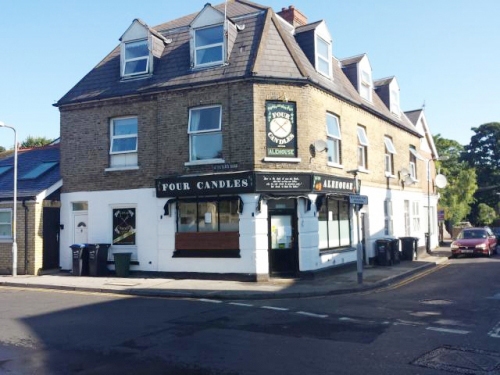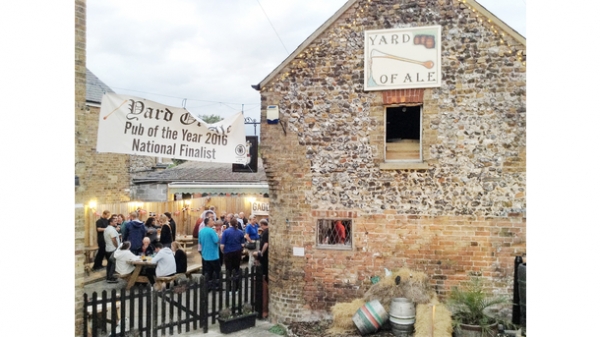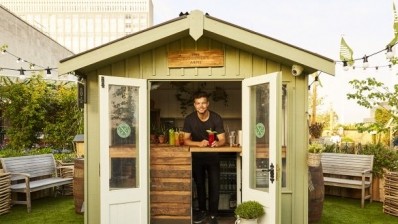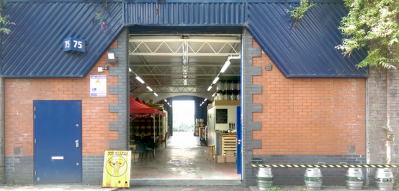Micropubs
The new micro wave: the rise of the micropub

The Isle of Thanet hasn’t been an actual island since the Wantsum Channel that separated it from the rest of Kent finally silted up around 200 years ago. But it somehow retains a distinct character, a slightly different way of doing things.
Take pubs. Thanet could arguably be designated the land of the micropub with, at last count, 15 trading in its 42 square miles, giving it the densest concentration in the country.
Why here? Like many other parts of Britain, the area was hit hard by a recession that left plenty of empty shops available at cheap rents.
But, as brewer and publican Eddie Gadd notes, the best advertisement for the micropub as a business opportunity is a visit to one. “You can’t really explain to someone how it works, but if you take them and show them, they say ‘I could do that’.”
Personal style
So the presence of the original micropub, Martyn Hillier’s Butcher’s Arms, just a few miles up the coast in Herne village, is crucial. People were able to go and see it, then copy it in their own style.
On Thanet, the phenomenon quickly reached a critical mass.
Gadd, indeed, continues to spur the process along, organising micropub minibus tours that start at his Ramsgate Brewery and end at his own regular-sized pub, the Montefiore Arms.
The Rise of the Micropub
As the wider pub industry battled its perfect storm of recession, smoking ban, pubco debt and licence reform, micropubs came to exemplify the adage that it’s an ill wind that blows nobody any good.
Indeed, the micropub model has enjoyed its own perfect set of circumstances that has encouraged it to proliferate. At least in a modest way – it’s not quite the 40,000 beer houses that opened in the wake of the 1830 Beer Act.
But like that legislation, from the end of 2005 the 2003 Licensing Act made it easier to open a pub in previously unlicensed premises. Then, as the economic downturn bit, small shops closed and began to become available at cheap rents.
Pubs were closing too, or turning to food and entertainment, depriving a certain demographic of places where they could simply go for a quiet pint.
And microbrewers were opening at pace, thanks to Progressive Beer Duty, introduced in 2002.
So the micropub had the licence, the premises, the customers and the beers.
It also had the entrepreneurs who could see that, while they were a fraction the size of the regular pub, they could be commercially viable if the business model had low enough costs.
As other pubs diversified to survive, the micropub shrank its focus to firkin-size, stripping out multiple product lines to become a cask-ale specialist – just as consumers started to take a renewed interest in beer.
Truncated opening hours, along with a confined trading area, made it possible for the business to be operated by one or two people.
The result was a place that cared about beer, and an environment in which sociability was unavoidable.
So the micropub works. The conditions are right. And as critical mass gathers, as it has on Thanet, we can perhaps expect them to become a common feature of every town and city.
But questions remain. No one has formally defined the micropub and versions have begun to appear serving food and, heaven forfend, lager. Yet the original micropub, the Butcher’s Arms, has inscribed above its door the acronym NFL – you work it out. As a new pub sector takes shape, get ready for the rows.
The Hair of the Dog, Minster
Open midday to 10pm Monday to Thursday, midday to 11pm Friday and Saturday, midday to 3pm Sunday
Gary Hake and Julie Beaney are in their third year at this former high street hair salon in Thanet’s ancient capital.
Three constantly changing ales and five ciders are served from a room adjoining the rustic bar.
“I wanted to wind down my day job, and I’d always wanted to know what it was like this side of the bar,” explains Hake. “I was concerned, too, about the lack of places where drinkers could just go for a drink.
“We want to help keep local brewers going and we mix their beers with guest ales. We don’t serve food, but we do let people bring in fish and chips from the shop across the road. I like to keep it simple.”
Ale Caesar, Margate
Open 2pm to 11pm Tuesday, 2pm to 9pm Wednesday and Thursday, noon to 10pm Friday and Saturday, noon to 6pm Sunday, closed Monday
Ale Caesar occupies part of the former Punch & Judy bar on the site of the recently revived Dreamland fairground, and has been trading as a pop-up over the summer.
The licensee is Matt Edmondson, no relation to X Factor presenter of the same name but brother of actor, comedian and musician Ade Edmondson.
Fittingly, it’s decked out as a celebration of British comedy and serves three beers on draught from a specially built cool room, plus local cider from the Kent Cider Co. There are also bottled beers for people to take down to the beach.
Edmondson runs it with friend Jeanette Brown while holding down his day job at charity Action on Hearing Loss.
“I’ve lived in Margate for 11 years and frequented the local micropubs. I like the atmosphere, the environment, the conversation – and drinking nice beers,” he said.
“The size here isn’t really micro, though. I’d like to get something more local and intimate next.”
Four Candles, Broadstairs
Open 5pm to 10pm Monday to Friday, noon to 3pm and 5pm to 11pm Saturday, midday to 3pm and 6pm to 10pm Sunday
A two-and-a-half-barrel brewery at the back of this former hardware shop means it can lay claim to being Britain’s smallest brew-pub.
Themed around the famous Two Ronnies sketch set in a similar hardware shop, Four Candles was founded by former journalist Mike Beaumont four years ago.
Three beers are sold, including Four Candles’ own brews, plus three ciders, three wines and fruit juices.
“I’d interviewed Martyn Hillier at the Butcher’s Arms and thought it was a great idea,” says Beaumont. “Pubs were turning into entertainment centres and I wanted a place where I could drink beer in convivial circumstances, the way pubs used to be.
“But I’ve never wanted to run a pub. This is an alehouse, going back to how pubs began. You don’t have to please all the people all the time, there’s no bar, no till and low overheads – there’s not enough room for more than one person to work here.
“I’m making a living, but I’m not going to make a fortune. Twenty customers in here and it’s packed!”
The Yard of Ale, St Peter’s
Open 5pm to 11pm Monday to Friday, noon to 11pm Saturday and Sunday
Reflecting how important micropubs have become, the Yard of Ale made it into the last four in the Campaign for Real Ale’s 2015 National Pub of the Year.
The ‘Yard’ is the cobbled yard of funeral director H Noble, and it was the family firm’s Ian Noble, with the help of former Met police officer Shawn Galvin, who set up the pub in disused stables in 2014.
There are four beers on tap in what Noble describes as “an artificial cellar” behind the bar, plus six ciders. And, unusually, the Yard of Ale serves food, including a cheese board of local cheeses.
“I see it as a traditional pub rather than a micropub,” he says. “It’s a hobby that’s gone well.”
Bringing Variety to Local Areas
According to the Micropub Association, there are now 273 micropubs in Britain – and they are starting to impact on the industry.
Mainstream pubs in areas like Thanet are feeling the pressure of cheaper pints, and there are concerns the micros have an unfair advantage over businesses that have to bear the full weight of overheads and regulation.
At the same time, it’s appreciated that micropubs are bringing life and variety to local trade.
As Kent brewer Shepherd Neame puts it: “We welcome a broad choice of outlets for the consumer and healthy competition, provided all pubs can compete on a level playing field.”
Enterprise Inns chief executive Simon Townsend visited Thanet recently to find out for himself the impact the new competition was having, accompanied by John Woodward, the pubco’s regional manager for east Kent.
“To my mind, anything that gets people off their sofas and out of the house, away from supermarket beer, can only benefit all styles of on-trade operator in the long run,” says Woodward.
“It can feel like we’ll never compete with the micro operator on a level playing field, because of all the regulation imposed on us.
But while it was initially quite frustrating, I firmly believe that by adhering to the basics of great standards, a wide range and excellent customer service, we’ll maintain our position.
"Traditional operators shouldn’t fear the growth of these outlets as long as we focus on fresh beer at the right temperature in the correct branded glassware, served in a warm, clean, safe environment. Add to that a good food offer and regular entertainment and it should satisfy most visitors. It isn’t always about price!”
A spokeswoman for Thanet council, which is responsible for licensing in the area, said micropubs received no preferential treatment, but “it’s a simpler business, and that makes licensing simpler”.
“They have the advantages of not needing PRS or gaming licences, and they benefit from lower business rates and lower overheads in general. We aren’t actively encouraging nor discouraging them, they are just popular in this area and part of the regeneration of Thanet.
A number of people have set up new businesses here, and micropubs work.
We used to have a lot of pubs, and a lot have closed, but there’s still a demand. They can’t be the same size, though.”
